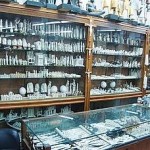Illegal Elephant Ivory Sales Increasing in Egypt
Is hurting the elephants to get their ivory tasks to be sold to illegal buyers okay?
The illegal industry in elephant ivory is prospering in Egypt due to the absence of law enforcement, brought about with the entry into the black market of the Chinese buyers, deemed to be the key consumers.
Based on the recent report, Egypt is still one of Africa’s largest prohibited markets for illegal ivory items wherein no ivory items can be sold legally in Egypt without a special permit. Despite the buying and selling of these illegal items, no special permit has ever been issued.
According to senior government officials interviewed by the report’s authors, Esmond Martin and Lucy Vigne, since 2009, only two ivory seizures had taken place in Egypt, both at Cairo airport, while there had been no confiscations of ivory items from retail outlets since 2003.
During the latest survey carried out in March and April 2011, the authors counted 8343 ivory items openly for sale in Cairo, a city described as the “carving centre of the country”.
Despite the recent political unrest almost all outlets and workshops were open in the old market–Khan al-Khalili–Cairo’s main centre for the manufacture and retail sale of ivory products.
Previous TRAFFIC surveys of Cairo and Luxor, the two main Egyptian ivory markets, in 1998 and 2005 found an overall 43 percent reduction in the combined number of ivory objects for sale, but this figure had only dropped by a further 10 percent in the 2011 survey, mostly in Luxor.
“The encouraging demise of Egypt’s illegal ivory markets between 1998 and 2005 has now lost all momentum. Government regulators have faltered and Egypt retains its unenviable position as a leading ivory retailing offender,” said Tom Milliken, TRAFFIC’s ivory trade expert.
The report found that while Spanish, Italians and Americans were the main buyers in 2005, more Egyptians and Gulf Arabs were now buying ivory rosaries and walking sticks, but the Chinese have become the principal buyers, reportedly purchasing over half of all worked ivory sold.
One ivory vendor told the investigators that Chinese buyers would sometimes spend USD50,000 on buying illegal ivory items during one bargaining session.
